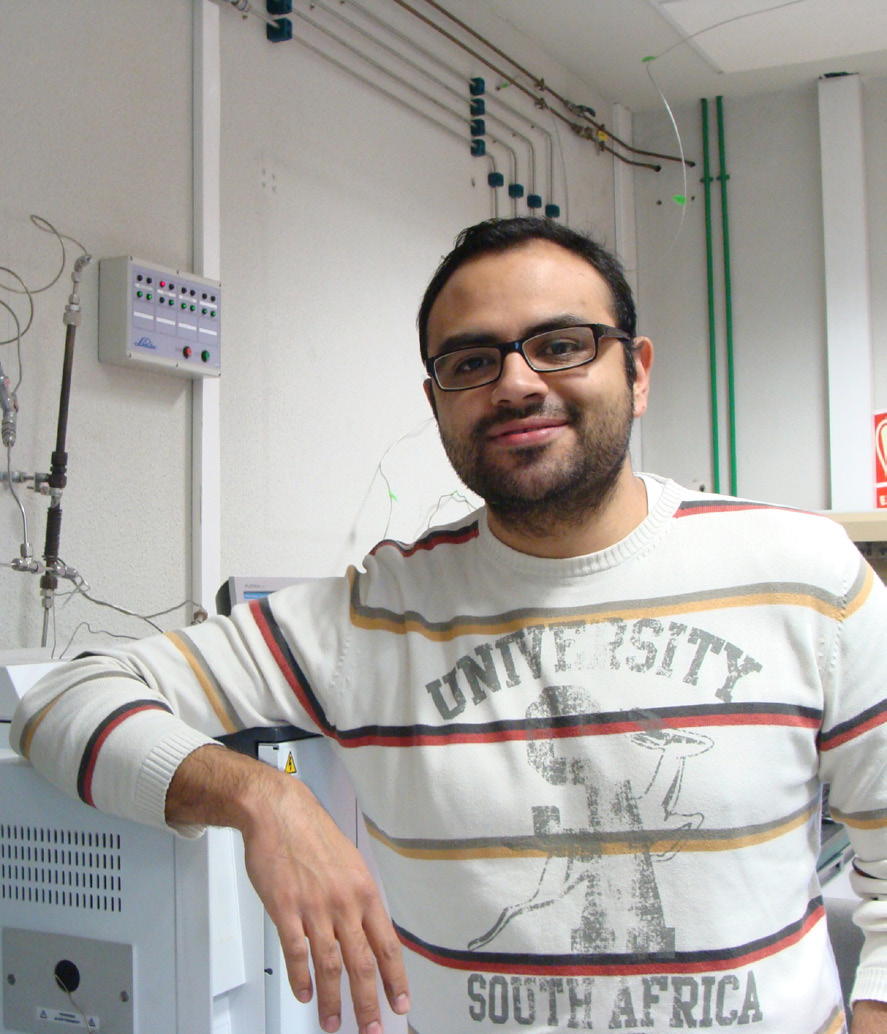The Colombian researcher Oscar Hernando Laguna Espitia has won one of the seven prizes awarded by the Department of Culture, Education, Youth and Sports of the Seville City Council to the best doctoral theses defended at the University of Seville and the Pablo de Olavide University during the 2010-2011 academic year. The prize was awarded for his work “Preferential oxidation of CO in the presence of H2: design of catalysts based on CeO2 and application to microreactors”, presented at the University of Seville and carried out, for the most part, at the Institute of Materials Science of Seville (ICMS). This thesis was directed by José Antonio Odriozola, Professor of Inorganic Chemistry at the University of Seville, and Miguel Ángel Centeno, Research Scientist at the CSIC.
Óscar Hernando Laguna, who is currently furthering his training at the University of the Basque Country, was an FPI fellow between September 2007 and October 2011 in the research group led by Professor Odriozola (Department of Inorganic Chemistry of the University of Seville-ICMS). In this period he participated in projects aimed at developing fuel processors for mobile applications based on the production of energy from hydrogen (H2). Guided by Professors Odriozola and Centeno, Óscar Hernando Laguna developed his doctoral thesis on the elimination of the carbon monoxide (CO) remaining in the hydrogen streams produced when transforming alcohols. These currents are used to feed the fuel cells, which in turn will produce electricity.
In awarding this thesis, the Department of Culture, Education, Youth and Sports of the City Council of Seville has valued the relevance of the theoretical and practical contributions of the work, which has a wide projection in the energy sector. The study of the purification of hydrogen streams contributes, mainly, to optimize the use of hydrogen as an alternative energy source, with less polluting waste. The application of this type of research has repercussions in a better performance of fuel cells, the electric batteries that work from hydrogen and that, due to their versatility, can be used with promising results in mobile devices or in the automotive industry, to cite a couple of examples.
As the author himself points out, from the beginning this thesis was designed from an integrative approach, contemplating from fundamental principles to final applications. “First of all, catalysts for CO oxidation have been designed. This involves conceiving the systems from atomic scales to understand the principles from which the CO oxidation reaction is favored,” describes Óscar Hernando Laguna. To this end, systems based on cerium oxide modified with different transition metals have been used. “Subsequently, a kinetic analysis of the most promising systems in the preferential CO oxidation reaction in the presence of H2 (PROX) has been carried out, with a view to scaling up the process in the future”.
According to the researcher, one of the most striking aspects of the work came when considering the final application. In this last phase, a prototype microreactor (or microchannel reactor), designed and manufactured in the ICMS laboratories for the PROX reaction, was successfully put into operation. In the words of Óscar Hernando Laguna, “these devices favor what is called ‘process intensification’, which leads to an increase in energy efficiency and the production of fewer by-products. Both the industry and the scientific community are convinced that their development offers an attractive outlook for this type of reactions at industrial level”. Not surprisingly, such are the possible applications of this type of studies related to the purification of hydrogen streams that some of the projects in which this researcher has participated have been developed together with leading companies in the energy sector, such as the multinational Petroleos do Brasil (Petrobas).
The integrative approach of this doctoral thesis has allowed it to stand out not only for its industrial projection, but also in the academic field, where it has had a notable impact. To date, eleven articles have been published in international journals as a result of this research. Óscar Hernando Laguna has also had the opportunity to participate in several international congresses related to the topic of catalysis or microreactors, where he has made presentations presenting part of the results obtained.
The awards ceremony for the best theses – each with a cash prize of 2,000 euros – will be held in the Salón Colón of the Seville City Hall on December 4, 2012, at 11:00 am. The ceremony will be presided over by the Mayor of Seville, Juan Ignacio Zoido, and the rectors of the University of Seville and Pablo de Olavide University.




